Tel:+8618231198596

News
 CONTACT
CONTACT
 CONTACT
CONTACT
- Linkman:Linda Yao
- Tel: +8618231198596
- Email:linda.yao@dcpharma.cn
- Linkman:CHARLES.WANG
- Department:Overseas
- Tel: 0086 0311-85537378 0086 0311-85539701
News
Sustainable farming initiatives prioritize the responsible use of tylvalosin tartrate premix.
TIME:2024-08-14
1. Understanding Tylvalosin Tartrate Premix
a. Overview of Tylvalosin Tartrate
Tylvalosin tartrate is a macrolide antibiotic derived from tylosin, used in livestock feed to manage bacterial infections and promote growth. It is effective against a range of Gram-positive bacteria and some Gram-negative bacteria, making it a valuable tool in maintaining animal health. Available as a premix, it is incorporated into feed to provide precise dosing and consistent distribution.
b. Benefits of Tylvalosin Tartrate Premix
The primary benefits of tylvalosin tartrate premix include its role in disease prevention, promotion of growth, and improvement of feed efficiency. By controlling bacterial infections, it supports animal health and productivity, which can lead to cost savings and better overall performance.
2. Sustainable Farming and Feed Additives
a. Principles of Sustainable Farming
Sustainable farming aims to create agricultural systems that are environmentally friendly, economically viable, and socially responsible. Key principles include reducing environmental impact, optimizing resource use, enhancing biodiversity, and ensuring animal welfare. In the context of feed additives, sustainability involves using these products in ways that minimize negative effects on the environment and support long-term farm health and productivity.
b. Role of Feed Additives in Sustainability
Feed additives like tylvalosin tartrate can contribute to sustainability by improving animal health and feed efficiency. When used responsibly, they help reduce the need for more intensive interventions, support efficient resource use, and enhance overall farm productivity. However, their use must be managed carefully to align with sustainable farming goals.
3. Responsible Use of Tylvalosin Tartrate Premix
a. Dosage and Application
i. Precision in Dosage: Accurate dosing of tylvalosin tartrate premix is crucial for maximizing its benefits while minimizing risks. Overuse can lead to antimicrobial resistance and environmental contamination, while underuse may not provide the desired health benefits. Following recommended dosage guidelines ensures that tylvalosin tartrate is used effectively and responsibly.
ii. Integration into Feed: Proper mixing of tylvalosin tartrate premix into feed is essential for uniform distribution and efficacy. Sustainable farming practices involve using precise mixing techniques and equipment to ensure that the premix is evenly incorporated, reducing waste and optimizing its effectiveness.
b. Monitoring and Resistance Management
i. Antimicrobial Resistance: The responsible use of tylvalosin tartrate includes managing the risk of antimicrobial resistance. This involves adhering to recommended dosages, avoiding unnecessary use, and implementing strategies to monitor and mitigate resistance. Sustainable farming practices emphasize the importance of resistance management to preserve the effectiveness of antibiotics and protect animal and human health.
ii. Surveillance and Reporting: Regular monitoring of resistance patterns and reporting any issues to relevant authorities helps ensure that tylvalosin tartrate remains effective and that any emerging resistance is addressed promptly. Sustainable farming initiatives support these practices as part of a broader strategy to maintain the efficacy of antimicrobial agents.
c. Environmental Impact
i. Residue Management: The management of tylvalosin tartrate residues in manure and other environmental sources is a key aspect of sustainability. Proper handling and treatment of manure can reduce the risk of contamination and environmental impact. Sustainable farming practices include strategies for managing residues and minimizing their effects on soil and water quality.
ii. Reducing Environmental Footprint: Implementing best practices in feed production and animal management can help reduce the overall environmental footprint of tylvalosin tartrate use. This includes optimizing feed formulations, improving nutrient use efficiency, and exploring alternative solutions to minimize reliance on antibiotics.
d. Animal Welfare and Productivity
i. Enhancing Health and Welfare: Responsible use of tylvalosin tartrate contributes to better health and welfare for livestock. By preventing and managing infections, tylvalosin tartrate supports animal well-being and reduces the need for more invasive treatments. Sustainable farming practices prioritize animal welfare as a fundamental aspect of farm management.
ii. Improving Productivity: The use of tylvalosin tartrate to enhance feed efficiency and growth rates supports farm productivity. Efficient use of feed and resources aligns with sustainability goals by optimizing production and reducing waste. Sustainable farming initiatives seek to balance productivity with environmental and animal welfare considerations.
4. Future Directions and Innovations
a. Development of Alternatives
i. Natural and Novel Antimicrobials: Research into natural and novel antimicrobial agents offers potential alternatives to traditional antibiotics like tylvalosin tartrate. These alternatives may provide similar benefits without the same environmental or resistance concerns. Sustainable farming initiatives support the development and use of such alternatives as part of a broader strategy to enhance farm sustainability.
ii. Integrated Health Management: Integrating tylvalosin tartrate with other health management practices, such as vaccination and biosecurity measures, can provide a comprehensive approach to livestock health. This integrated strategy can reduce reliance on antibiotics and support overall sustainability goals.
b. Education and Best Practices
i. Training and Awareness: Educating farmers and feed manufacturers about the responsible use of tylvalosin tartrate and other feed additives is essential for promoting sustainable practices. Training programs and resources can help stakeholders understand best practices and implement effective strategies for managing feed additives.
ii. Sharing Knowledge: Collaborative efforts between researchers, industry professionals, and policymakers can facilitate the sharing of knowledge and best practices related to feed additives and sustainability. These partnerships can drive innovation and support the adoption of sustainable farming practices.
Conclusion
Sustainable farming initiatives prioritize the responsible use of tylvalosin tartrate premix to ensure that it contributes positively to farm health, productivity, and environmental stewardship. By focusing on precise dosing, resistance management, environmental impact, and animal welfare, farmers and feed manufacturers can use tylvalosin tartrate effectively while aligning with sustainability goals.
- Tel:+8618231198596
- Whatsapp:18231198596
- Chat With Skype







